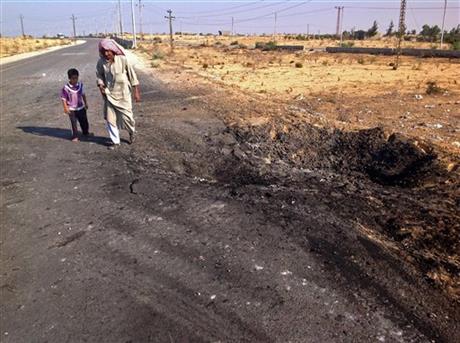
By HAMZA HENDAWI
A man and child walk past a crater from a suicide car bomb attack on the road between the border town of Rafah and the coastal city of el-Arish, Egypt, Wednesday, Nov. 20, 2013. A suicide bomber rammed his explosive-laden car into one of two buses carrying off-duty soldiers in Egypt’s turbulent region of northern Sinai on Wednesday, killing nearly a dozen and wounding dozens more and wounding dozens more, security and military officials said. (AP Photo/Ahmed Abu Deraa)
Mideast Egypt
A cap and a pair of new a suicide car bomb attack on the road between the border town of Rafah and the coastal city of el-Arish, Egypt, Wednesday, Nov. 20, 2013. A suicide bomber rammed his explosive-laden car into one of two buses carrying off-duty soldiers in Egypt’s turbulent region of northern Sinai on Wednesday, killing nearly a dozen and wounding dozens more and wounding dozens more, security and military officials said. (AP Photo)
Mideast Egypt Sinai
FILE – In this Tuesday, May 21, 2013, file photo, Egyptian Army soldiers patrol in an armored vehicle backed by a helicopter gunship during a sweep through villages in Sheikh Zuweyid, northern Sinai, Egypt. A suicide bomber rammed his explosive-laden car into one of two buses carrying off-duty soldiers in Egypt’s turbulent region of northern Sinai, Wednesday, Nov. 20, 2013, killing many and seriously wounding tens, security and military officials said. It was the latest in a series of similar attacks targeting army and police facilities and checkpoints. (AP Photo, File)
Prev
1 of 3
Next
CAIRO (AP) — A suicide bomber rammed his explosive-laden car into one of two buses carrying off-duty soldiers in Egypt’s turbulent region of northern Sinai on Wednesday, killing 11 and wounding 37, security and military officials said.
They said the suicide bomber struck when the two buses traveled on the road between the border town of Rafah and the coastal city of el-Arish. The explosion damaged both buses, the officials said.
The soldiers belong to the 2nd Field Army, which is doing most of the fighting against Islamic militants waging an insurgency against security forces in Sinai. The buses were on their way to Cairo, the officials said.
The officials spoke on condition of anonymity as they weren’t authorized to release the information.
Col. Mohammed Ahmed Ali, a military spokesman, said the wounded were being treated in military hospitals.
“The precious blood of our sons strengthens our resolve to cleanse Egypt and shield its sons from violence and treacherous terrorism,” Ali wrote on his Facebook page.
The northern Sinai region, which borders Gaza and Israel, has been restless for years, but attacks have grown more frequent and deadlier since the July ouster of Islamist President Mohammed Morsi.
There was no immediate claim of responsibility for Wednesday’s attack, but suicide car bombings are a signature method by militant groups linked to or inspired by al-Qaida.
It was the latest in a series of similar attacks targeting army and police facilities and checkpoints. In August, gunmen pulled 25 police conscripts off minibuses in the Sinai and shot them dead on the side of the main road linking Rafah to el-Arish.
Northern Sinai’s violence occasionally has spilled over into cities in the southern part of the peninsula as well as mainland Egypt, targeting policemen, soldiers and politicians.
In September, the interior minister, who is in charge of the police, survived an assassination attempt by a suicide car bomb. Earlier this week, a senior security officer who monitors Islamist groups, including Morsi’s Muslim Brotherhood, was shot dead as he drove in Cairo’s eastern Nasr City district.
Nasr City is a Brotherhood stronghold and home to several military barracks.
In a video clip posted Tuesday on the Internet, a militant group, Ansar Jerusalem, claimed responsibility for this week’s slaying of the security officer, police Lt. Col. Mohammed Mabrouk. Ansar Jerusalem said the killing was in retaliation for the recent arrest of female Morsi supporters.
The group had previously claimed responsibility for the attempt on the interior minister’s life and an attack on military intelligence compounds in the Suez Canal city of Ismailia and the southern Sinai city of Tor.
Meanwhile, clashes late Tuesday between revolutionary youths opposed to military rule and police killed two people, including a teenager, said Ahmed el-Ansari, head of Egypt’s emergency services. He said the teenager suffered a head wound from a birdshot pellet and died while being taken to hospital. The second, a 23-year-old man, died from a gunshot wound to the head, he said.
The violence in Cairo’s famed Tahrir Square followed daylong protests marking the second anniversary of clashes between protesters and police on an adjacent street. A joint police and army contingent cleared the square of protesters late Tuesday.
On Wednesday at dawn, assailants threw a grenade at a police checkpoint in a northern Cairo suburb, injuring four policemen, security officials said. The assailants fled the scene, the officials said.
Authorities have since Morsi’s ouster waged a major crackdown against the Brotherhood, arresting some 2,000 top and middle-level members and several thousand followers. Hundreds were killed when security forces cleared two protest camps of Morsi supporters in August.
Morsi, along with the group’s top leaders, are in detention and face trials on charges that vary from murder and inciting murder to conspiring with foreign powers and corruption.
Supporters of the former president have staged near-daily protests against the July 3 coup, mostly in universities. The number of protesters, however, has been dwindling, although they occasionally mass several thousand.
___



